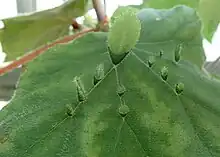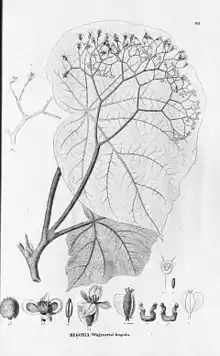Begonia hispida
Begonia hispida, the piggyback begonia (a name only applied to individuals with leaflets), is a species of flowering plant in the family Begoniaceae, native to southeastern and southern Brazil.[1] They are occasionally cultivated due to their "piggyback" leaflets which grow directly from veins in the main leaves.[2][3] The piggyback mutation is also seen in Arabidopsis.[4]
| Begonia hispida | |
|---|---|
 | |
| Leaflets of putative variety B. hispida var. cucullifera | |
 | |
| Botanical illustration | |
| Scientific classification | |
| Kingdom: | Plantae |
| Clade: | Tracheophytes |
| Clade: | Angiosperms |
| Clade: | Eudicots |
| Clade: | Rosids |
| Order: | Cucurbitales |
| Family: | Begoniaceae |
| Genus: | Begonia |
| Species: | B. hispida |
| Binomial name | |
| Begonia hispida | |
| Synonyms[1] | |
|
Begonia hispida var. cucullifera Irmsch. | |
References
- "Begonia hispida Schott ex A.DC". Plants of the World Online. Royal Botanic Gardens, Kew. Retrieved 19 April 2022.
- McManus, Michael T.; Veit, Bruce E. (2002). Meristematic Tissues in Plant Growth and Development. p. 134. ISBN 9780849397929.
- "Begonia Species, Piggyback Begonia Begonia hispida var. cucullifera". Dave's Garden. MH Sub I, LLC dba Internet Brands. 2022. Retrieved 19 April 2022.
- Kidner, C. A.; Wrigley, S. (2010). "Patches, pegs and piggies". New Phytologist. 187 (1): 13–17. doi:10.1111/j.1469-8137.2010.03297.x. PMID 20624231.
This article is issued from Wikipedia. The text is licensed under Creative Commons - Attribution - Sharealike. Additional terms may apply for the media files.